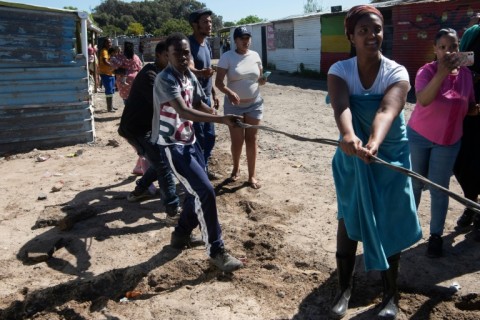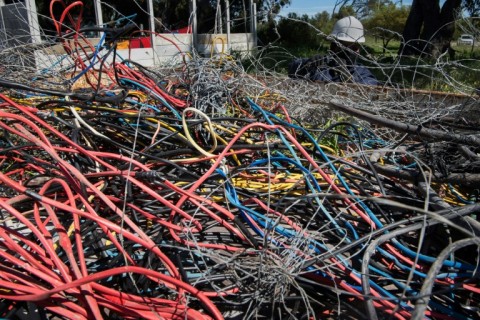CAPE TOWN - A woman in a black and white dress struggled, pulling fiercely on a long electrical cable as she tried to stop the police in anti-riot gear from carrying it away.
Used to illegally connect homes in a poor informal settlement south of Cape Town, it was one of many cables seized by South African police during a raid on Wednesday.
To the woman and other locals unable to pay utility bills it represented a lifeline.
But authorities in a country facing a severe energy emergency regarded it as a burden on public coffers and the overstretched energy grid.
"At the end of the day, what to do? Do you just lay up and die or you try like any human being, animal, to fight for survival?" said Fernando Williams, 58, who lives at Oasis Farm, the informal settlement.

"This time survival is connecting to the grid unlawfully."
- Battered by blackouts -
South Africa has been battered by record blackouts that have hampered economic activity and angered the population, as problems at beleaguered power utility Eskom have mounted.
Operations to cut off illegal connections, which authorities blame for worsening the problem, are fairly common in the country.
"We cannot tolerate it because it's illegal, it's literally stealing from government, it's stealing from our paying, law-abiding customers," said Beverley Van Reenen, member of the municipal energy committee, who was at the scene.
The practice cost the city more than four million rand ($210,000) in the last financial quarter, she said, adding it was also dangerous.

"When it rains you can see the smoke coming from the ground," said a resident, who preferred to remain anonymous, as officers unearthed kilometres of multicoloured cables hidden underground and zigzagging through fields, bushes and shrubs.
- Power for oxygen -
But Marina, a local woman who gave only her first name, said some elderly people needed the electricity to power oxygen tanks. "Do you think it's fair as human beings to be treated like that?"
The raid came as blackouts intensified nationwide in recent days after a winter lull.
Electricity Minister Kgosientsho Ramokgopa on Sunday blamed the coincidence of planned power plant repairs with unplanned breakdowns.
But outages are expected to ease significantly in the coming months, as works to bring a giant coal power station back online continue, he told a press conference.
Four of six units at the Kusile plant are to become operational between October and the end of the year, Ramokgopa said, adding this would provide South Africa with a "critical path" out of the crisis.

Solving the electricity crisis is a crucial issue ahead of general elections next year, when the ruling African National Congress, in power since the advent of democracy in 1994, risks seeing its vote drop below 50 percent for the first time.
Kusile, the world's fourth largest coal-fired generator, has produced relatively little energy since it was commissioned in 2007, suffering from design and construction problems, breakdowns and allegations of graft.
Only last week police arrested nine people at the plant for theft and fraud over allegations they charged the station for coal that was never delivered.
str-ub/bp
By Julie Bourdin

